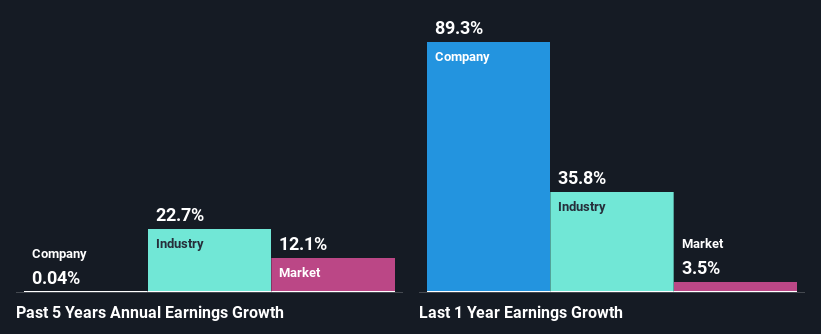Do Fundamentals Have Any Role To Play In Driving Bright Horizons Family Solutions Inc.'s (NYSE:BFAM) Stock Up Recently?
Bright Horizons Family Solutions' (NYSE:BFAM) stock up by 7.4% over the past three months. As most would know, long-term fundamentals have a strong correlation with market price movements, so we decided to look at the company's key financial indicators today to determine if they have any role to play in the recent price movement. In this article, we decided to focus on Bright Horizons Family Solutions' ROE.
Return on Equity or ROE is a test of how effectively a company is growing its value and managing investors’ money. Put another way, it reveals the company's success at turning shareholder investments into profits.
How Is ROE Calculated?
ROE can be calculated by using the formula:
Return on Equity = Net Profit (from continuing operations) ÷ Shareholders' Equity
So, based on the above formula, the ROE for Bright Horizons Family Solutions is:
11% = US$140m ÷ US$1.3b (Based on the trailing twelve months to December 2024).
The 'return' is the profit over the last twelve months. One way to conceptualize this is that for each $1 of shareholders' capital it has, the company made $0.11 in profit.
See our latest analysis for Bright Horizons Family Solutions
Why Is ROE Important For Earnings Growth?
So far, we've learned that ROE is a measure of a company's profitability. Depending on how much of these profits the company reinvests or "retains", and how effectively it does so, we are then able to assess a company’s earnings growth potential. Assuming everything else remains unchanged, the higher the ROE and profit retention, the higher the growth rate of a company compared to companies that don't necessarily bear these characteristics.
Bright Horizons Family Solutions' Earnings Growth And 11% ROE
To start with, Bright Horizons Family Solutions' ROE looks acceptable. Even so, when compared with the average industry ROE of 15%, we aren't very excited. On further research, we found that Bright Horizons Family Solutions' earnings over the past five years have been pretty flat. Bear in mind, the company does have a respectable level of ROE. It is just that the industry ROE is higher. Therefore, the flat earnings growth could be the result of other factors. Such as, the company pays out a huge portion of its earnings as dividends, or is faced with competitve pressures.
We then compared Bright Horizons Family Solutions' net income growth with the industry and found that the company's growth figure is lower than the average industry growth rate of 23% in the same 5-year period, which is a bit concerning.

Earnings growth is a huge factor in stock valuation. The investor should try to establish if the expected growth or decline in earnings, whichever the case may be, is priced in. This then helps them determine if the stock is placed for a bright or bleak future. Has the market priced in the future outlook for BFAM? You can find out in our latest intrinsic value infographic research report.
Is Bright Horizons Family Solutions Efficiently Re-investing Its Profits?
Bright Horizons Family Solutions doesn't pay any regular dividends, which means that it is retaining all of its earnings. This makes us question why the company is retaining so much of its profits and still generating almost no growth? So there might be other factors at play here which could potentially be hampering growth. For example, the business has faced some headwinds.
Conclusion
In total, it does look like Bright Horizons Family Solutions has some positive aspects to its business. However, while the company does have a decent ROE and a high profit retention, its earnings growth number is quite disappointing. This suggests that there might be some external threat to the business, that's hampering growth. Having said that, looking at the current analyst estimates, we found that the company's earnings are expected to gain momentum. To know more about the company's future earnings growth forecasts take a look at this free report on analyst forecasts for the company to find out more.
Have feedback on this article? Concerned about the content? Get in touch with us directly. Alternatively, email editorial-team (at) simplywallst.com.
This article by Simply Wall St is general in nature. We provide commentary based on historical data and analyst forecasts only using an unbiased methodology and our articles are not intended to be financial advice. It does not constitute a recommendation to buy or sell any stock, and does not take account of your objectives, or your financial situation. We aim to bring you long-term focused analysis driven by fundamental data. Note that our analysis may not factor in the latest price-sensitive company announcements or qualitative material. Simply Wall St has no position in any stocks mentioned.
 Wall Street Journal
Wall Street Journal